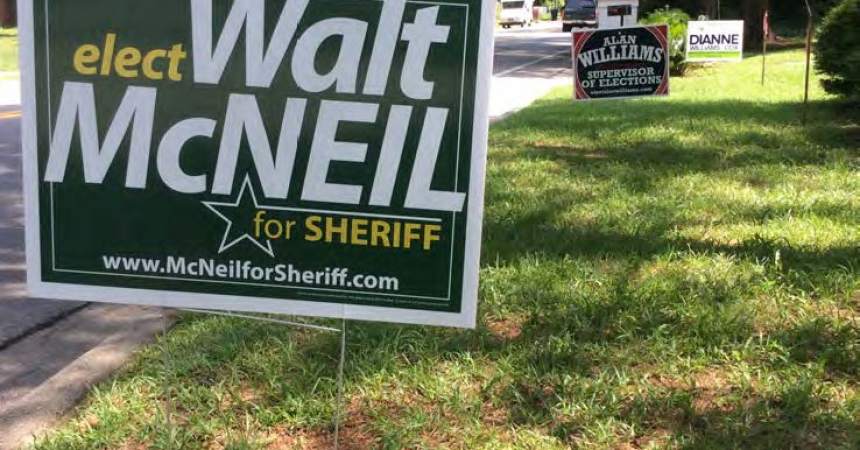
Small-town political campaigning comes with big price tag
By Damon Arnold
Outlook writer
By the time this year’s elections are held five months from now, most of the names that are in the midst of pre-primary campaigning will disappear.
Most of those who manage to get past the primaries generally are the candidates who have deep pockets or solid financial backers.
But while money isn’t an issue for the more popular candidates, it’s the ones who have big ambitions about becoming the voice of the people who generally fall short of their goal to win a political office.
For the “little guy,” a campaign could be draining in more ways than finances, although money is what it always comes down to.
They have to decide how best to spend the little that they have. Often the area where they can campaign is so small that they forego big-ticket items like billboards, banners, or yard signs. They often opt to stick to grass-roots campaigning, which sometimes comes with a hefty price tag in hiring necessary specialty services.
“Good help is hard to find, unless you pay for it,” said TJ Lewis, a candidate for District 2 Leon County Commissioner.
Lewis is a prime example of how small-town political campaigning sometimes go. He is single-handedly doing everything without a team, he said.
“When you run for office you become one of the loneliest people in the world,” said Lewis. “If you don’t have the bucks, then you have little to no help for your campaign.”
Lewis set a campaign budget of $10,000, a goal which he’s attained. His budget is small compared to some other candidates in local races. Lewis estimated that some of his opponents are operating on budgets ranging from $40,000 to $60,000.
With contribution requirements limiting candidates to donations of $250 on the local level, those who want to go big often do so by taking out loans or adding their campaign cost to their personal budgets.
“Honestly, a lot of money in local races you don’t need,” Lewis said. “They only do it to frighten other people out of the race. There is some big money in local races, and I’m thinking what do you need all that money for.”
But in the case of larger races, big money is indeed important to running a successful campaign. Take Diane Williams-Cox, for example. She is making her second attempt to win Seat 8 in the Florida House of Representatives.
However, she is relying heavily on old-school methods to push her platform.
“The richest resource is the people themselves,” Williams-Cox said. “Many times the people who will be impacted the most are the ones who can not afford to pay or contribute to a political campaign.
“We strategically look at what funding we have and what kind of funds we will need. We’re trying to make sure that we get our message out in the most effective way possible. Many of those ways don’t necessarily require money. Word-of-mouth, knocking door to door, passing out palm cards– palm cards do cost, but it doesn’t cost you anything to knock on their door.”
As much as candidates might do fund-raising, they often do so early in the race with a bit of uncertainty. Candidates have to qualify petitions and those who don’t garner enough signatures have to pay their way onto the ballot.
While Cox qualified more than a month ago, Lewis will have to pay to be placed on the ballot as one of a handful of candidates who couldn’t get enough signatures on a petition.
Petitions and having to pay to be on the ballot aside, political candidates have found unlimited free resources in social media platforms. They often find that platforms such as Facebook and Twitter can be a swift and effective way to get their messages out.
“I used social media quite a bit because I know that if nothing else, young people, middle aged people, and old people use social media, especially Facebook,” said Williams-Cox. “Social media is a good way to get your message across. In 140 characters you can send a message out on Twitter that can get somebody’s attention, or drive them to ask more questions or researching to get more information.”
But there is no avoiding more money means more mileage — in the form of bumper stickers, radio and print advertising. Money even determines whether a candidate could stage a campaign rally.
“If you have money and you have ground game, you’re sure to win the race. But most people don’t have both, they have one or the other,” said Lewis.








